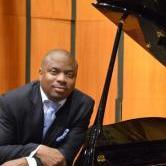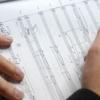Search the Community
Showing results for tags 'composition'.
-
I'm sure that most of you know that writing out music is very time consuming, whether you're spending 20 minutes on drawing your staff neatly for your notes to sit on, or constantly erasing notes on Finale because your mouse slipped by a centimeter and placed a Snare Drum buzz roll instead of a rim shot. Over the years of composing marching percussion music, I've developed another method of composing music that may prove useful to composers with limited time. Because this is so different in comparison to the notation that has always been used throughout the history of music, this probably won't gain any popularity at all among percussion composers. But I guess this is worth a shot, since it works for me, and might work for you. So let me begin presenting to you what I call the "Alphabet Notation" for rhythm or percussion. This is what one measure of rest looks like: / [ . . . . ] [ . . . . ] [ . . . . ] [ . . . . ] / / = measure bar [] = one count . = 16th subdivision of a measure A note's value is determined by the number of "." subdivisions that follow it (A 1/16th note having no following subdivisions, an 1/8th note having one following subdivision, and a 1/4 note having 3). Keep in mind that one count can fit four 16th notes in it. The classic "Eights" warm-up would look like this: TD (4/4) / [ 1 . 1 . ] [ 1 . 1 . ] [ 1 . 1 . ] [ 1 . 1 . ] / [ 2 . 2 . ] [ 2 . 2 . ] [ 2 . 2 . ] [ 2 . 2 . ] / And so on... BD (4/4) / [ 1 . 1 . ] [ 1 . 1 . ] [ 1 . 1 . ] [ 1 . 1 . ] / [ 2 . 2 . ] [ 2 . 2 . ] [ 2 . 2 . ] [ 2 . 2 . ] / And so on... SD (4/4) / [ R . R . ] [ R . R . ] [ R . R . ] [ R . R . ] / [ L . L . ] [ L . L . ] [ L . L . ] [ L . L . ] / And so on... For tenor and bassline, notes are represented by numbers corresponding to drum size. s = Spock Drum 1 S = Spock Drum 2 5 = Bass 5 X = rimshot x = stick click r = on the rim For snareline: R/L = right or left hand for each note Rr/Ll = flam notes Rz/Lz = buzzed notes X = rimshot x = stick click r = on the rim Tremolo is tricky, but hear me out. As most of you know, a tremolo line divides the notes value by two and fills the original value with notes of the new value. (A 1/4 note with a tremolo sounds like two eight notes; an 1/8th note with a tremolo sounds like two 16th notes.) In alphabet notation, consider this and maintain the count's value of four 16th subdivisions. When adding tremolo lines in this notation, you need to cancel out the subdivisions that the sound of the tremolo note goes over in that count. For example: (4/4) / [ R . L . ] [ R . L . ] [ R, L, ] [ R, L, ] // The first two counts are normal. But on counts three and four, you can see that I didn't include the second and fourth subdivisions on that count. That's because with the "," tremolo line, the eight note's value doubles into the next subdivision. Applying this concept may become increasingly difficult with drags on 16th notes, thus creating 32nd notes. To put it somewhat simple, you eliminate the "." subdivision that is played over with the preceding tremolo note. Two tremolo lines indicate a double stroke roll, which is basically 32nd notes filling the value of the original note. When placing two tremolo lines on a "[ R . . . ]" quarter note, you would write [ R,, ] since the entire count is played through, leaving no room for "." subdivisions. When placing two tremolo lines on "[ R . R .]" one of two 1/8th notes, you would write [R,, R . ] since the roll fills the 1/8th note value, leaving no room for the subdivision after the "R." Moving on, triplet figures indicated by underlining. For example, (4/4) / [ R L R L R L ] [ R . R L L ] [[ R Rl Rl ]] / [ R L R ] [ L R L ] [ R . . . ] [ R L L ] / [ R . . . ] [ . . . . ] [ . . . . ] [ . . . . ] // **Envision the bracket topped with a "3" that indicates a triplet figure in traditional notation.** The first count in the first measure presents a sextuplet figure, while the second count presents an regular 1/8th note followed by a triplet figure of 1/8th notes. For figures that last more than one count, you can combine the count brackets like I did in the first measure. It presents a triplet figure of quarter notes in the third and fourth counts. And in the second measure, the first, second and fourth counts present 1/8th note triplet figures, with a regular quarter note on the third count. Time signature in boldface preceding the first measure. Dynamics can be placed before the count in which it should be expressed in italics or cursive. Crescendos/Decrescendos between counts. For example: TD (4/4) / f [ 1 . 2 2 ] [ 3 . 4 . ] [ 3, 2, ] [ 1, S . ] / [ 1 1 1, ] > [ 2 2 2, ] > [ 3 3 3, ] > [ 4 4 4, ] > / p [ 4 . 4 4 ] [ . 4 4 . ] [ 4 . . . ] [ . . . . ] // >/< = crescendo or decrescendo And Accents indicated by bold faced notes. I'm sure most of you understand that one count consists of 4 16th subdivisions. That's basically what this notation is based on. There are no rests, you're pretty much looking at the subdivisions for each count and plugging in the notes from there. I believe this can make music translatable through keyboard without needing a special program. And when writing music by hand, this can safe the time-consuming preparations, like drawing the 5-line staff. And this is new, so of course, there's tons of room for evolution if Alphabet Notation turns out useful to anyone else.
- 6 replies
-
- 1
-

-
- percussion
- composition
-
(and 4 more)
Tagged with:
-
Here is a link of 22 great quotations from composers: http://www.classicfm.com/discover/music/inspiring-composer-quotes/ Let's discuss some of these at least. I think many hold great truths about composition. But some are debatable and we might not agree with what is said. In particular: 1. What do you think about the Benjamin Britten quote (No. 18 in the series of slides)? I don't agree with it. Inspiration often keeps me up at night and I don't think that that is mere loss of sleep. Who said that had I slept and put away my inspired state of mind, I would have been able to continue it in the morning. Besides, there is the silence at night which would be conductive to composition. So to me at least, night is often conductive to composing. 2. I don't agree with Elgar's quote (No. 7). I think that art elevates man and brings man closer to God. At least, I believe that this would be true of the greatest artistic works, the greatest compositions. Had he said "Some religions are against art", that would have been true. What are your opinions? Feel free to voice your opinions about any of the other 20 inspiring composer quotes in the link, or to discuss them in general. You might even add to the 22 quotations in the link other great composer quotes that haven't been included and give your opinion about them.
-
Hi everyone, first post here. I'm Nizar, I learned to play piano (on a synthesizer) empirically and only by ear through the years. I never took a lesson nor studied anything related to music or composition, so I'm quite ignorant about many aspects. However, I really enjoy the act of creation in music. I never thought of entering a composers' forum, so here I am. I'm extremely curious to get your feedback, it will be much appreciated, starting with this piece : Thank you! Nizar PS : I use Reaper and Kontakt for recording, as Virtual Instruments are 100x better and more realistic than my synthesizer. PS2 : I just bought a Kawai "stage piano" (ES8) last weekend, so the experience of playing is radically different and my inspiration is sky-rocketing :)
- 8 replies
-
- 1
-

-
- piano
- composition
-
(and 2 more)
Tagged with:
-
A composition by me trying to depict our Planet Earth and how we humans are affecting it.Consisting of 5 parts, Home starts in the pure and intact nature, a kind of peaceful musical environment, and then goes to the next part which is construction and consumption and goes on until it gets to a so called destruction and annihilation part which is certainly a harsh and dark part.Then the song reaches an uplifting part where humans are taking part to rebuild and reconstruct the planet.And then again in the end we have the first part which is the pure nature, leaving the listener in a condition where he or she should decide on what will happen next or better to say what to do next. Would be really happy to know your ideas, comments and reviews. by the way the music is actually written with the concept to be synced with video scenes from nature and other places, so consider it. thanks in advance :) P.S. Sorry I don't have access to a good Internet Now so I had to give you the link to my soundcloud. https://soundcloud.com/aronfard/home
-
Hi, Here is my new composition for a movie soundtrack. Thanks for your comments! Best regards, Max Casey
- 3 replies
-
- piano
- composition
-
(and 2 more)
Tagged with:
-
I thought you guys might be interested in my new series! I'm creating 2-3 minute videos about writing for every member of the woodwind family. I also am more than happy to answer any questions that are posted on the video. If you're interested, here's the playlist:
-
I hope you enjoy my latest piano composition! You can also find me at https://www.youtube.com/channel/UCbDBYUBl1CZLCdcPVmCsU_g where I will continuously post new works as I create them!
-
Hi everyone! I'm new to the site, just looking to work with some new composers. I run a music studio that offers mock up (recording), orchestration and engraving services. We really enjoy working with new composers and are always excited about taking on new collaborators! Our primary focus is creating realistic recordings of music without the expense of hiring live musicians for session work. We are all composers and know the hassle of getting great quality recordings and we would love to help you guys out. We just launched our new site and are looking at taking on some new projects. So, if you have any projects that you need recorded or published (maybe before school starts in the fall!), please contact us! We would love to work with you! Here is our website: http://silverlingvirtualstudio.weebly.com/ Also note that we offer a 10% academic discount on our orchestration and engraving services. Check out some of our demos and let us know if you'd like us to work on your music next!! Best of luck, Cody Ortz, Founder of Silverling Virtual Studio
-
- recordings
- website
-
(and 4 more)
Tagged with:
-
First and foremost; I do not know anything about string playing. As a result of such inadequacy, there are maybe some double stops (don't think triple stops) that are a bit hard to play. I've had a friend look at it, and I've had the string teacher at my school look at it. My friend the string teacher is convinced that it is almost definitively a college piece. I just wanted to write a fugue. P.s. The ending might be a little. inappropriate. it was meant to be funny but now that i look at it after the fact, I think I might implore a different last few bars.
-
New here. Is this the right place for a technical question? About Sibelius notation. So I tend to think of an accent (>) as shortening the note it sits over. Sibelius playback apparently does not, it just boosts the velocity/attack on the the note. So I have written > over . on the notes to get a short and accented note. Which do you think the players would rather see? My take is that the accent makes SPACE around the note, so it's going to shorten it somewhat, but not the 50% you get from a staccato. so > over . is hit harder AND stopped at 50% of length. Would you rather have > over . ?
- 5 replies
-
- accent
- composition
-
(and 1 more)
Tagged with:
-
Hello, I want to make a piano cover of the song Agape by Bear's Den. I've already looked in the internet for a music sheet but no results. I found a video on youtube of a cover which sounds perfect, however I can't see properly which chords he's playing and there's no music sheet provided. This is the video So please, if you could help me I'd be really grateful. Thank you
-
What pieces have you started writing and KNOW you need to finish them!!??!!??!
- 6 replies
-
- composition
- writers block
-
(and 1 more)
Tagged with:
-
I think it is rather easy to become like a train as a composer, following the path or tracks one has created for oneself (or that have been laid down for one), more or less oblivious to what other composers are doing. Indeed, at some level that is essential; for in no other way would one be able to become a composer, an original composer, to forge one's own path as a composer. And yet, one can become too fixed in one's tracks, too much on autopilot as regards one's formula of composition. How then does one introduce novelty? (Or how does one develop, evolve, or progress as a composer?) I think the challenge would be to introduce novelty but not "novelty for the sake of novelty". How does one do that? Indeed, can one even do it deliberately? Perhaps the challenge is to find the right balance between novelty and a recognizable style. Or to unconsciously pursue novelty, to be upon a course of unconscious evolution along the path forged by one's compositional style. What are your thought and insights about this?
- 5 replies
-
- composition
- outlook
-
(and 3 more)
Tagged with:
-
Does it constitute the creation of art of universal value? Or does it constitute spiritual revelation? Or is it an intellectual act with an intellectual rather than an artistic product? Does it constitute a message to humanity? Does it constitute a manifestation of human civilization, of human culture? More negatively perhaps, do composers via their compositions seek their own glory, attention, and praise? Does composition at some level constitute an instance of the vain human motivation of seeking recognition and praise? On the other hand, what is the contribution of composition - that a composer makes via composition - to life, to society, and to human history?
- 6 replies
-
- composition
- meaning
-
(and 3 more)
Tagged with:
-
Do you ever record them and store them on your computer to be able to easily access whenever you are in the mood of composing and are in need of a theme? That's what I do.
- 3 replies
-
- inspiration
- manage
-
(and 1 more)
Tagged with:
-
Hi, i a have a Bachelor in Music Composition. Classical stuff, academic music. Afeter finishing my studies bac in 2008, i´ve been doing mainly contemporary popular music, influenced by tango, world music, rock and jazz. I am now looking for a place to do a master in composition, Europe o USA are my favorites. But i dont know which place will be good to develop composition technique in an "ECM" style, of course, looking for my personal voice. I have a few pieces os my Quintet, which show my personal style/search and level. Know good places to check? I imagine NYU would be a pretty good place... Would love to hear your opinions... https://www.youtube.com/watch?v=pnq3ptAAfrA&list=PLC4Bl1ZWyLBEJ3KDyCl2SKy95_7EpyHG4
- 7 replies
-
- composition
- tango
-
(and 3 more)
Tagged with:
-
How committed are you to your compositional style? How much do you feel you should stick to the style that you have so far usually composed in? Do you feel diverging from it is a strength, or a weakness? Do you think writing in multiple styles is a strength, or a weakness? Do you think the management of your compositional style - whether you stick to your extant style of diverge from it - and even the very creation of a style to begin with, is a conscious and deliberate process? Or is it rather an unconsciously, naturally occurring matter over which you have little or no control?
- 27 replies
-
- composition
- style
-
(and 3 more)
Tagged with:
-
Hi all, I am currently studying a music degree and i need to get different composers views on how they compose. My research project is about the compositional devices and techniques that different composers use in order to convey specific emotions and metaphors to the audience, all music should evoke some sort of emotion within the listener and my research project is dedicated to finding out how composers manage to do this. There are 4 questions to this questionnaire and if you could spare some time to share some of your knowledge I would greatly appreciate it and it would help my project immensely! These are the 4 questions: 1.Which elements of composition do you find are the most effective with regards to conveying emotion and feeling through your music? Instrumentation, tempo, key/mode, time signatures/time change, arrangement etc.? Please explain why you find these effective. 2.Do you find any of the above elements particularly effective when trying to convey a specific emotion such as anger, Love or sadness etc.? Why do you find these so effective? 3.How much interaction is there between yourself and the director of the film which you are composing for? Does the director offer much input regarding the music and why do you feel the director offers this input (if any)? 4.What compositional advice would you give anyone who was faced with the challenge of conveying thoughts and emotions through their music? If you can manage the time to help me out with my project by answering these questions you would be helping me out a great deal! Thanks for your time
-
- film music
- music
-
(and 4 more)
Tagged with:
-
Hello everyone ! :) I kindly request you to excuse me for the disturbance, but as presently student in Master's degree in Economics & Psychology at Panthéon-Sorbonne and Paris Descartes (and I'm also a musician since my 6 years old), I'm in search of composers for an experience on feedback in music composition within the framework of my master thesis. The experiment consists in making up a short composition of 8 measures, then to suggest modifications on the composition of another participant. Then, there is the possibility to modify its own composition. In extra, there is an Xperia Sony Z3 tablet Compact to win by drawing lots for people arriving at the end of the experiment :) I shall largely be grateful to you if you agreed to participate in it and if you pass it in your concerned circle of acquaintances ! Best regards, Olivia L
-
- experiment
- feedback
-
(and 2 more)
Tagged with:
-
When I compose for the piano I can't help falling back to an easy listening - light classical genre... You can find 2 recent pieces here... https://www.youtube.com/results?search_query=composerpj86 The third piece was an improvisation from a cd that I made a few years ago.
-
Unfortunetely, service is not available now. Symphonic Music.mp3
-
- composition
- orchestration
-
(and 2 more)
Tagged with:
-
Hi everyone , I have any question :) . Firstly my English is very bad. So I'm sorry . I'm composition student at university and I have scholarship but my class is preparation . My Professor and my friend says my compositions very good but I'm writing tonal music but I cant write contemporary music . example : I cant write Whole tone music or I cant write like Stravinsky . What can I do ? I want to write contemporary music , whole tone and like stravinsky . My Professor said that so early but my other Professor said that you can start contemporary . What can I do ? :) Thak you . I'm sorry for my english is very bad.
- 4 replies
-
- composition
- contemporary
-
(and 2 more)
Tagged with:
-
Hi all, I'm new here, this is my first post. I know nothing about making music, at all. I tried picking up a couple different instruments in my youth, but never stuck to it and lost interest. The thing is, I have tons of songs in my head that I really want to get out onto paper, computer, recording, something? I come up with them all the time, not even meaning to, but they get stuck in my head, and I want to get them out. The songs are complete in terms of music, just no lyrics there. Any advice on what to do here? I don't know how to compose or play any instruments so I could record, and even if I could play one instrument, for example the piano, I would have to learn many instruments in order to record an entire song. Is there some kind of software that will help me here? Thanks in advance.
- 4 replies
-
- composition
- recording
-
(and 1 more)
Tagged with:
-
Hello fellow young composers! We're three young composers based in Sydney, Australia organising an exciting project - an opportunity for composers to come together and create a new, collaborative work "in 4." inspired by Terry Riley's "in C.". This work will be performed a fantastic collective of musicians in Sydney, Australia. We have already received many submissions from all around the world and would love more composers to be a part of this project. In order to create this work, we're asking you to submit ONE cell of written music that creatively and appropriately reflects the number "4". There is no limit to how and what you notate, however, if conventional notation is used it must be written in the treble staff. The cell must be written for an "open ensemble" (see below for FAQ). The submitted cells will then be curated by our team into a new, collaborative work - to be performed by a quartet of quartets. Send your submission to info@themusicboxproject.com (.pdf and any image file types will be accepted) with the subject "in 4 submission" and include your name. A confirmation email will be sent upon submission. FAQ What exactly are you planning to do with my cell of music? In the same vein as Terry Riley's in C., we hope to arrange the submitted cells into a single work. This process of organising and arranging the material into a cohesive work will be completed by a team of Sydney based composers. If we receive 53 submissions we have the chance of creating a record breaking, collaborative composition. What is an open ensemble? The idea of "open instrumentation" or an "open ensemble" means that you have to consider that your cell will be performed (with limited modification) by any/combination of instruments. Cells which work most effectively in this way will more likely be chosen. MORE INFORMATION: http://www.themusicboxproject.com/project-in-4 Thanks the music box project. team :nod: :nod: :nod:
- 1 reply
-
- composition
- terry riley
-
(and 3 more)
Tagged with:
-
Hey all, Out of curiosity, how do you compose? What is your process? Do you sit down at the keyboard, or the computer, at the same time every day with a cup of coffee and work diligently until something good comes out of it? Or does inspiration strike when you least expect it, and then you rush for a piece of paper before you forget that brilliant idea? Do you start with chord progressions? Work phrase by phrase, one part at a time? Write the entire melody, and then go back and fill in the other parts? How do you work? (I work a bit every day, phrase by phrase, and part by part. Then go back and read through each part while playing the whole thing, and be sure that each part makes intuitive sense from a sight reading perspective, and adjust chords if it doesn't, add dynamics, accents, etc, let it sit for a few days to clear my head, and then come back with fresh ears for a last check. At that point I'm heartily sick of the piece, so I keep everyone's comments in mind for the NEXT piece, but don't usually do much post-feedback editing.)
- 18 replies
-
- process
- composition
-
(and 2 more)
Tagged with:













